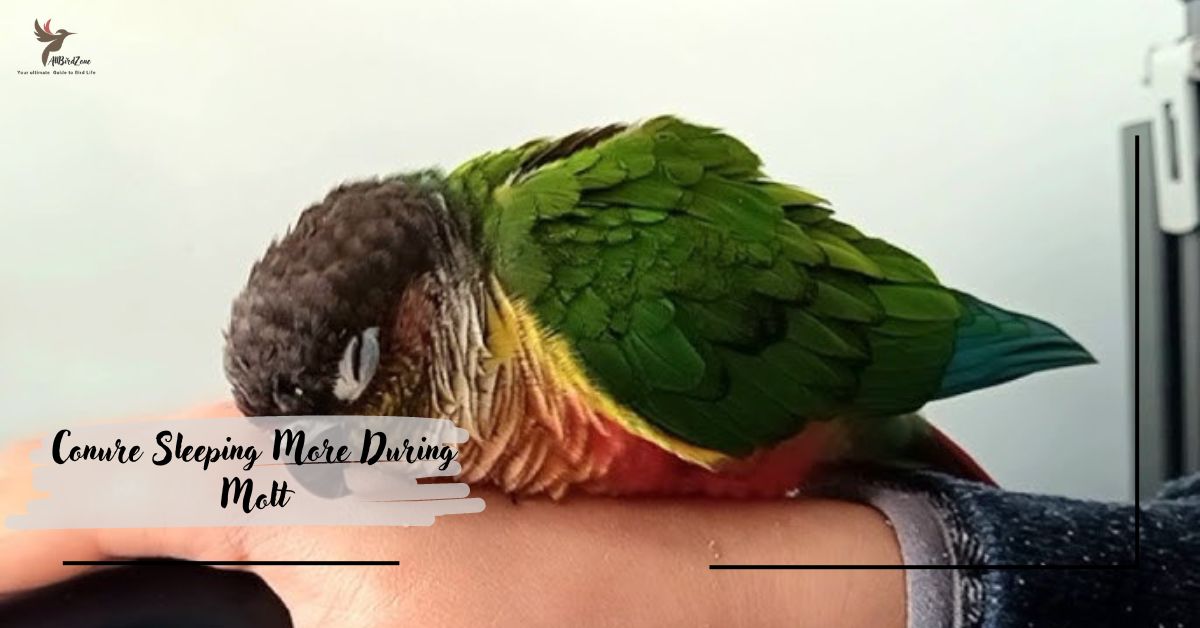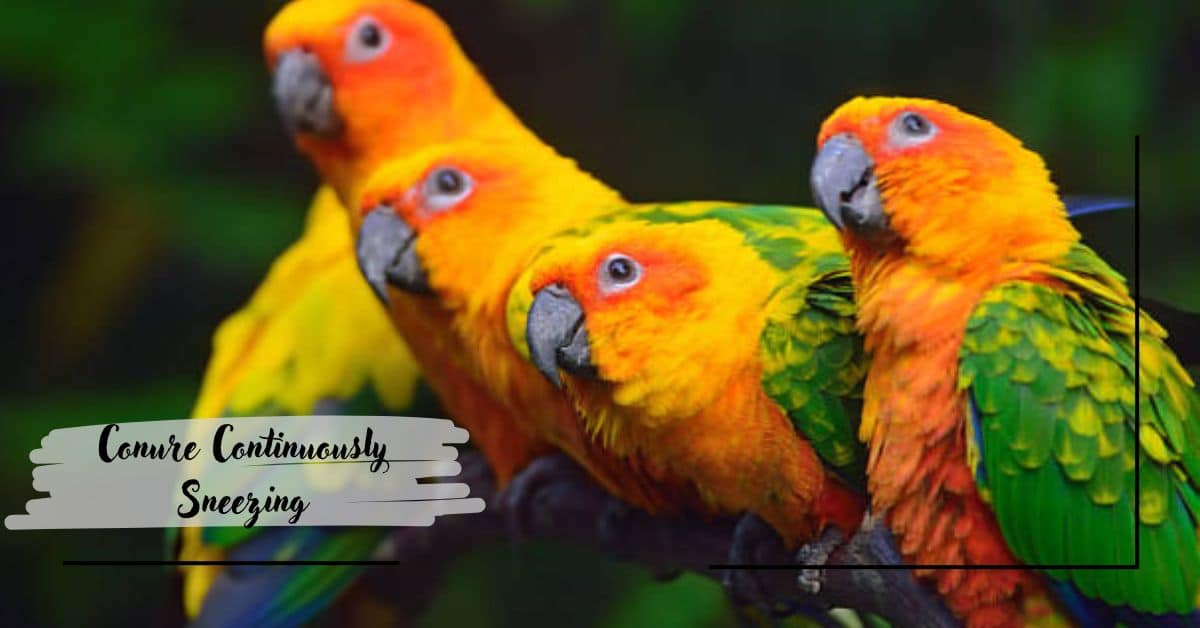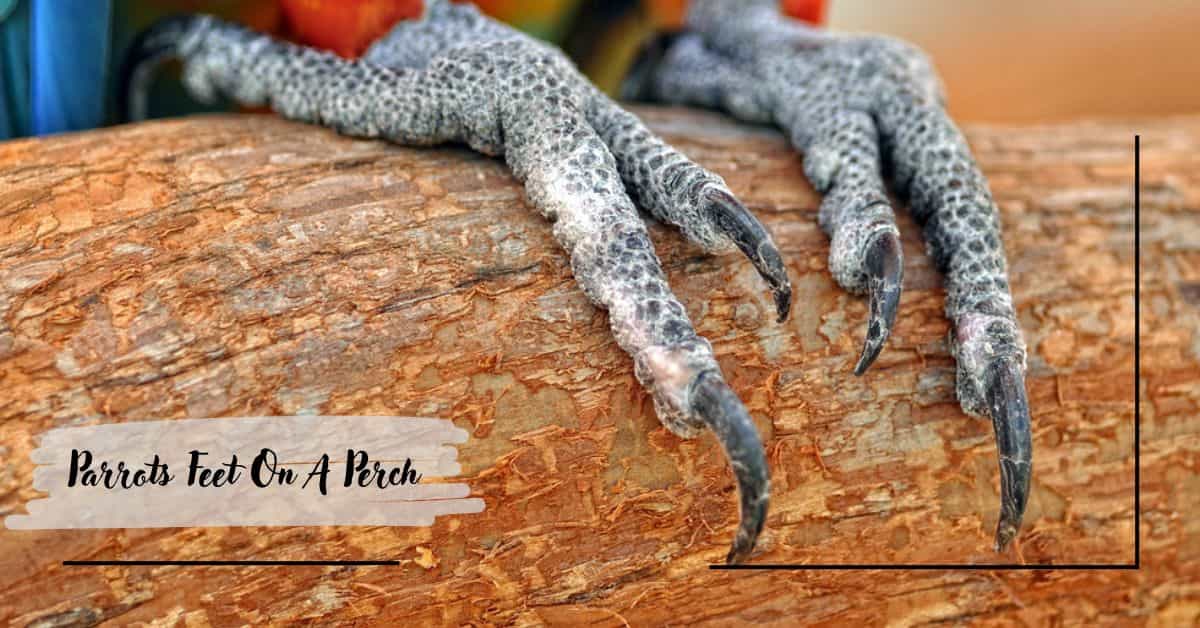Conure Sleeping More During Molt because growing new feathers takes a lot of energy. It’s important to let them rest for 12-13 hours in a quiet, dark place without any disturbances. This extra sleep helps their new feathers grow properly and keeps them comfortable. Just be patient and give your bird the rest it needs during molting.
What is Molting in Conures?
Molting is the natural process where birds shed old feathers and grow new ones. This cycle helps maintain healthy feathers, which are essential for flying, insulation, and overall well-being. In conures, molting typically happens once or twice a year and can last several weeks. It can be uncomfortable and requires extra energy for feather regrowth, which is why many birds, including conures, show changes in behavior during this time.
Why Do Conure Sleeping More During Molt?
Molting is a physically demanding process that drains energy. Growing new feathers requires high amounts of protein, leading to an increase in metabolic activity. To recover, conures sleep more than usual to conserve energy and aid their bodies in generating new feathers. Sleep helps to reduce the stress and discomfort that come with growing new feathers, especially when pin feathers (the new feathers) begin to emerge.
When Does Molting Affect Sleep Patterns in Conures?
Conures are most affected by molting during their major molting periods, which can happen during spring and fall. During this time, your conure’s sleep patterns might change, and it may become less active, spending more time resting. Molting can last anywhere from a few weeks to a few months, depending on the bird’s age, health, and species.
How Can You Support a Conure During Molting?
During molting, it’s crucial to provide a supportive environment for your conure. Here’s how you can help:
Provide Nutrient-Rich Food:
Protein is essential for feather growth, so ensure your conure’s diet includes high-quality pellets, fresh vegetables, and occasional seeds or nuts.
Create a Calm Environment:
Avoid too much handling or loud noises during molting, as this can increase stress. Your bird will appreciate a quieter, relaxed space.
Offer Regular Baths:
Let your conure bathe frequently. Bathing helps soften the feathers and reduce itchiness, making the molting process more comfortable.
Which Signs Show That Your Conure’s Sleep is Normal During Molt?
Some signs of normal sleep behavior during molting include:
- Increased Napping: Your conure may nap more during the day and sleep earlier at night.
- Slight Reduction in Activity: The bird may not be as playful or energetic but will still show interest in food and interaction.
- Comfortable Positioning: If your conure sleeps in its usual spots and positions without signs of distress, it’s likely resting normally.
If your conure becomes excessively lethargic, loses appetite, or displays unusual behaviors, it’s best to consult a vet.
What Can Help Relieve a Conure’s Discomfort During Molt?
To relieve a conure’s discomfort during molting, provide toys for distraction to keep their focus away from the irritation, and offer frequent bathing or lightly mist the bird with water to soothe itchy skin and help loosen old feathers. Ensure you handle your conure gently, as new pin feathers are sensitive. Avoid overhandling if your bird seems uncomfortable, and maintain a calm environment to reduce stress during this energy-intensive time.
How Can I Take Care of My Conure During the Molt?
Taking care of your conure during molting involves ensuring its diet, environment, and comfort are well-managed. Here are some detailed steps:
Keep the Cage Clean:
Molting causes your conure to shed feathers, creating extra debris. Regular cleaning of the cage is essential not only to maintain hygiene but also to prevent respiratory issues from feather dust. Clean perches, food dishes, and the cage floor daily to ensure a healthy environment during this sensitive period.
Ensure Proper Hydration:
Hydration is crucial for a molting bird, as it helps with the regeneration of feathers and keeps the skin moist, reducing discomfort. Always provide fresh, clean water and consider offering hydrating fruits like melons or cucumbers. You may also offer occasional electrolyte supplements (as recommended by a vet) to support your conure’s overall health during molting.
Provide Extra Protein:
Molting requires significant protein intake for feather growth, so consider adding protein-rich foods like scrambled eggs, cooked chicken, or protein-enhanced pellets to their diet.
Maintain a Calm Environment:
Reducing stress during molting is vital. Keep the environment quiet and avoid sudden changes, as stress can hinder feather growth and make the molting process harder for your bird.
What Diet is Best and Healthful for Conures During Molting?
A molting conure requires a diet high in nutrients, especially protein and vitamins, to support feather growth. Ideal foods include:
- Pellets: High-quality pellets should make up the bulk of your conure’s diet.
- Leafy Greens: Spinach, kale, and collard greens are great for vitamins.
- Eggs: A small amount of boiled or scrambled egg can offer additional protein.
- Fruits: Apples, berries, and melons provide hydration and vitamins.
Are Birds Less Active When Molting?
Yes, birds, including conures, often become less active during molting. They conserve energy to focus on feather regeneration, so it’s normal for them to be quieter and rest more. You might notice your conure spending more time perching and preening rather than flying or playing.
How Long Does Molting Really Last For?
Molting can last anywhere from 2 to 4 weeks, although the process may take up to 2 months in some birds. The exact duration depends on the species, age, and health of your conure. Younger birds tend to have quicker molts, while older ones may take longer to complete the process.
How Do You Comfort a Molting Bird?
To take care of your conure during molting, ensure its environment is clean and stress-free, as molting produces extra debris, and a hygienic space helps prevent health issues. Make sure your bird stays hydrated by providing fresh water and hydrating fruits like melons. Molting also requires more protein for feather regrowth, so incorporate protein-rich foods like scrambled eggs or protein pellets into their diet. Maintain a calm environment by minimizing loud noises and disruptions, allowing your conure to rest and recover comfortably during this energy-intensive period.
Do Parrots Also Eat and Sleep More During Their Molt?
Yes, parrots, including conures, typically eat and sleep more during their molt. They require additional nutrients to grow new feathers, so it’s common for them to have an increased appetite. Similarly, more sleep helps them manage the energy-intensive molting process.
How Much Sleep is Too Much for My Bird in Usual and During Molt?
A healthy conure typically needs about 10-12 hours of sleep per night. During molting, they might sleep longer, but if your bird is sleeping excessively (more than 14 hours) and seems lethargic or weak, it’s best to consult a vet to ensure there are no underlying health issues.
What are Parrot Molting Symptoms and How Best to Deal With Them?
- Feather Shedding: You’ll notice feathers falling out, especially from the wings and tail.
- Pin Feathers: New feathers growing in appear as small, pin-like structures.
- Irritability: Birds might be a bit crankier during molting due to discomfort.
Frequently Asked Questions:
Can molting cause my conure to become aggressive?
Yes, molting can make conures irritable or aggressive due to the discomfort and sensitivity caused by new pin feathers. It’s important to be patient and handle your bird gently during this time, reducing interaction if your conure seems particularly uncomfortable.
Should I change my conure’s diet during molting?
Yes, adjusting your conure’s diet during molting is beneficial. You should increase foods rich in protein, vitamins, and minerals, such as boiled eggs, leafy greens, and fortified pellets, to support healthy feather growth and reduce stress.
Do conures lose weight during molting?
A conure can lose a small amount of weight during molting due to the energy demands of growing new feathers. However, significant weight loss is not normal and may require a visit to the vet.
Can conures become itchy during molting?
Yes, molting often causes itchiness, especially when new pin feathers are growing. Offering regular baths or misting your conure with water can help relieve this discomfort and soften the feathers.
Is it normal for a conure’s behavior to change during molting?
Yes, behavioral changes are common during molting. Your conure may be less active, more irritable, or quieter than usual. This is a normal response to the physical stress of molting and should return to normal once the molt is complete.
Conclusion:
It’s normal for Conure Sleeping More During Molt as their bodies work hard to grow new feathers. Extra rest helps them recover and manage the stress of the molt. By providing a protein-rich diet, clean environment, and minimizing stress, you can support your conure through this process and ensure a smooth, healthy molt. Understanding these changes will keep your bird comfortable and healthy during this time.







